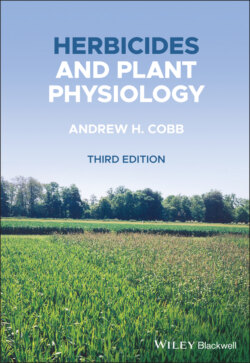Читать книгу Herbicides and Plant Physiology - Andrew H. Cobb - Страница 14
1.2 Distribution
ОглавлениеOn a global basis only about 250 species are sufficiently troublesome to be termed weeds, representing approximately 0.1% of the world’s flora. Of these, 70% are found in 12 families, 40% alone being members of the Gramineae and Compositae. Interestingly, 12 crops from five families provide 75% of the world’s food and the same five families provide many of the worst weeds (Table 1.1). This implies that our major crops and weeds share certain characteristics and perhaps common origins.
Table 1.1 Important plant families which contain both the major crops and the worst weeds of the world.
Source: Radosevich, S.R. and Holt, J.S. (1984) Weed Ecology: Implications for Vegetation Management. New York: Wiley. Reproduced with permission of John Wiley & Sons.
| Number of species classified as the world’s worst weeds (%) | Family | Examples of major crops | Examples of major weeds | Common name |
|---|---|---|---|---|
| 44 | Gramineae | Barley, maize, millett, oats, rice, sorghum, sugar cane and wheat | Elytrigia repens (L.) | Couch |
| Alopecurus myosuroides (L.) | Black‐grass | |||
| Avena fatua (L.) | Wild oat | |||
| Sorghum halepense (L.) Pers. | Johnson grass | |||
| Echinochloa crusgalli (L.) | Barnyard grass | |||
| 4 | Solanaceae | White potato | Solanum nigrum (L.) | Black nightshade |
| Datura stramonium (L.) | Jimsonweed | |||
| Hyoscyamus niger (L.) | Henbane | |||
| 5 | Convolvulaceae | Sweet potato | Convolvulus arvensis (L.) | Field bindweed |
| Cuscuta pentagona (Engelm) | Field dodder | |||
| Ipomoea purpurea (L.) Roth | Tall morning glory | |||
| 5 | Euphorbiaceae | Cassava | Euphorbia maculata (L.) | Spotted spurge |
| Euphorbia helioscopia (L.) | Sun spurge | |||
| Mercurialis annua (L.) | Annual mercury | |||
| 6 | Leguminosae | Soybean | Cassia obtusifolia (L.) | Sicklepod |
| Melilotus alba (Desc) | White sweetclover | |||
| Trifolium repens (L.) | White clover |
